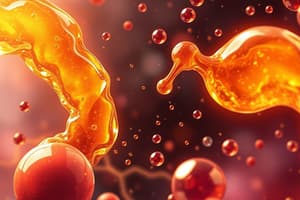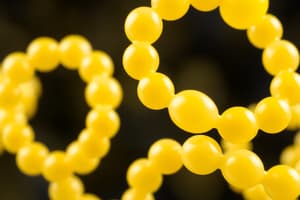Podcast
Questions and Answers
What is the desirable level of total cholesterol in mg per 100 mL?
What is the desirable level of total cholesterol in mg per 100 mL?
- < 200 mg / 100 mL (correct)
- > 250 mg / 100 mL
- < 150 mg / 100 mL
- < 100 mg / 100 mL
Which macronutrient contributes 1100 kcal in a 2000 kcal diet based on the given percentages?
Which macronutrient contributes 1100 kcal in a 2000 kcal diet based on the given percentages?
- Proteins
- Fats
- Carbohydrates (correct)
- Fiber
What is the maximum desirable level of LDL cholesterol in mg per 100 mL?
What is the maximum desirable level of LDL cholesterol in mg per 100 mL?
- < 130 mg / 100 mL (correct)
- < 115 mg / 100 mL
- > 130 mg / 100 mL
- < 100 mg / 100 mL
How many grams of total fat is recommended per day in a 2000 kcal diet?
How many grams of total fat is recommended per day in a 2000 kcal diet?
Which of the following is a protein fat replacer used by food processors?
Which of the following is a protein fat replacer used by food processors?
What type of fat is considered the best for health?
What type of fat is considered the best for health?
Which type of fat is primarily derived from animal sources like butter and meat?
Which type of fat is primarily derived from animal sources like butter and meat?
Which lipid classification includes cholesterol?
Which lipid classification includes cholesterol?
Which type of fatty acid is known to help lower cholesterol levels?
Which type of fatty acid is known to help lower cholesterol levels?
What is a common characteristic of lipids?
What is a common characteristic of lipids?
Which of the following is a problem associated with excessive fat intake?
Which of the following is a problem associated with excessive fat intake?
Which type of fat is typically found in oils derived from olives, avocados, and nuts?
Which type of fat is typically found in oils derived from olives, avocados, and nuts?
What role do lipids play in the body besides energy storage?
What role do lipids play in the body besides energy storage?
What is the normal range of cholesterol in blood for individuals aged 31-40 years?
What is the normal range of cholesterol in blood for individuals aged 31-40 years?
Which type of cholesterol is known as 'bad' cholesterol?
Which type of cholesterol is known as 'bad' cholesterol?
What is the recommended daily fat intake for a diet of 2,000 calories?
What is the recommended daily fat intake for a diet of 2,000 calories?
Which of the following foods is a significant source of cholesterol?
Which of the following foods is a significant source of cholesterol?
Which is an important function of cholesterol in the body?
Which is an important function of cholesterol in the body?
At what level is cholesterol considered high, based on mmol/liter?
At what level is cholesterol considered high, based on mmol/liter?
What is the normal cholesterol level range measured in mmol/liter?
What is the normal cholesterol level range measured in mmol/liter?
What dietary component is primarily responsible for raising blood cholesterol levels?
What dietary component is primarily responsible for raising blood cholesterol levels?
Study Notes
Definition of Lipids
- Lipids are organic compounds that are insoluble in water but soluble in organic solvents like ether and chloroform.
- Terms "oil," "fat," and "lipids" are commonly confused; "oil" refers to liquid fats at room temperature, while "fat" denotes solid fats.
Functions of Fat
- Provides energy storage and supply.
- Acts as chemical messengers and helps in cholesterol formation.
- Regulates body temperature and forms membrane lipid layers.
- Involved in producing prostaglandins, which play roles in inflammation.
Problems Associated with Excess Fat
- High fat intake is linked to health issues like high cholesterol, poor digestion, and obesity.
- Being overweight contributes to various health disorders and lifestyle inconveniences.
Types of Fat
- Fatty acids are the basic units of fat, categorized into saturated, unsaturated (including polyunsaturated and monounsaturated).
Saturated Fats
- Increase levels of LDL (bad cholesterol).
- Common sources include milk, cheese, butter, fatty meats, and some plant oils like coconut.
Unsaturated Fats
- Polyunsaturated fats help lower cholesterol and are found in vegetable oils and fish.
- Monounsaturated fats are considered the healthiest, found in olives, avocados, and nuts.
Lipid Classification
- Types include triglycerides (neutral fats), phospholipids, sphingolipids, glycolipids, steroids (cholesterol), and waxes.
Cholesterol
- A vital, fat-like substance produced by the liver mainly from dietary fats, essential for cell membranes, hormone production, metabolism, and nutrient absorption.
- High intake of cholesterol and saturated fats can lead to atherosclerosis, increasing risks for heart disease and stroke.
Cholesterol Types
- LDL (low-density lipoprotein) is the "bad" cholesterol, contributing to artery plaque buildup.
- HDL (high-density lipoprotein) is the "good" cholesterol, aiding in the removal of excess cholesterol from the bloodstream.
Recommended Cholesterol Levels
- Normal range:
- Total cholesterol: <200 mg/100 mL
- LDL: <130 mg/100 mL
- HDL: >35 mg/100 mL
- Triglycerides: <200 mg/100 mL
Dietary Fat Recommendations
- For a 2000 calorie diet, recommend 10% of calories from fats, roughly 22 grams or 6 teaspoons of oil per day.
Important Sources of Fat
- Animal fats from dairy, eggs, and meats; prepared fats like butter.
- Plant oils sourced from seeds like sesame, olives, and corn.
Cholesterol in Foods
- Found primarily in animal products; absent in plant-based foods.
Healthy Dietary Fats
- Encouragement to consume low-fat foods for better heart health.
Energy Nutrient Distribution
- For a daily 2000 kcal diet:
- Carbohydrates: 55% (1100 kcal)
- Lipids: 30% (600 kcal)
- Proteins: 15% (300 kcal)
Free Dieting Macronutrient Calculator
- Suggested daily intake:
- Carbohydrates: 225g
- Protein: 150g
- Fat: 55g
- Meal breakdown:
- Carbs: 45g, Proteins: 30g, Fat: 11g.
Studying That Suits You
Use AI to generate personalized quizzes and flashcards to suit your learning preferences.
Related Documents
Description
Test your knowledge on lipids, including their functions, types, and food sources. This quiz will also cover daily fat requirements and provide insight into cholesterol. Gain a deeper understanding of how fats contribute to health and nutrition.




